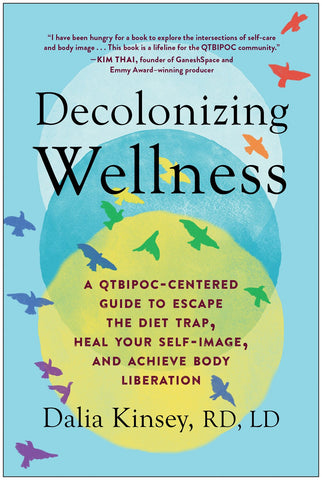2022 NATIONAL INDIE EXCELLENCE AWARDS WINNER — LGBTQIA NONFICTION
"The author offers an empowering perspective for people whose identities are often marginalized in the health and wellness industry." —Manhattan Book Review
Become the healthiest and happiest version of yourself using wellness tools designed specifically for BIPOC and LGBTQ folks.
The lack of BIPOC and LGBTQ representation in the fields of health and nutrition has led to repeated racist and unscientific biases that negatively impact the very people they purport to help. Many representatives of the increasingly popular body positivity movement actually add to the body image concerns of queer people of color by emphasizing cisgender, heteronormative, and Eurocentric standards of beauty. Few mainstream body positivity resources address the intersectional challenges of anti-Blackness, colorism, homophobia, transphobia, and generational trauma that are at the root of our struggles with wellness and self-care.
In Decolonizing Wellness: A QTBIPOC-Centered Guide to Escape the Diet Trap, Heal Your Self-Image, and Achieve Body Liberation, registered dietitian and nutritionist Dalia Kinsey will help readers to improve their health without restriction, eliminate stress around food and eating, and turn food into a source of pleasure instead of shame. A road map to body acceptance and self-care for queer people of color, Decolonizing Wellness is filled with practical eating practices, journal prompts, affirmations, and mindfulness tools. Ultimately, decolonizing nutrition is essential not only to our personal well-being but to our community’s well-being and to the possibility of greater social transformation.
This is a body positivity and food freedom book for marginalized folks. It’s a guide to throwing out food rules in exchange for internal cues and adopting a self-love-based approach to eating. It’s about learning to trust our bodies and turning mealtime into a time for celebration and healing.
It’s also a love letter to those of us who struggle with our bodies and a gentle plea for us to do the work it takes to accept, trust, and love ourselves.
"The author offers an empowering perspective for people whose identities are often marginalized in the health and wellness industry." —Manhattan Book Review
Become the healthiest and happiest version of yourself using wellness tools designed specifically for BIPOC and LGBTQ folks.
The lack of BIPOC and LGBTQ representation in the fields of health and nutrition has led to repeated racist and unscientific biases that negatively impact the very people they purport to help. Many representatives of the increasingly popular body positivity movement actually add to the body image concerns of queer people of color by emphasizing cisgender, heteronormative, and Eurocentric standards of beauty. Few mainstream body positivity resources address the intersectional challenges of anti-Blackness, colorism, homophobia, transphobia, and generational trauma that are at the root of our struggles with wellness and self-care.
In Decolonizing Wellness: A QTBIPOC-Centered Guide to Escape the Diet Trap, Heal Your Self-Image, and Achieve Body Liberation, registered dietitian and nutritionist Dalia Kinsey will help readers to improve their health without restriction, eliminate stress around food and eating, and turn food into a source of pleasure instead of shame. A road map to body acceptance and self-care for queer people of color, Decolonizing Wellness is filled with practical eating practices, journal prompts, affirmations, and mindfulness tools. Ultimately, decolonizing nutrition is essential not only to our personal well-being but to our community’s well-being and to the possibility of greater social transformation.
This is a body positivity and food freedom book for marginalized folks. It’s a guide to throwing out food rules in exchange for internal cues and adopting a self-love-based approach to eating. It’s about learning to trust our bodies and turning mealtime into a time for celebration and healing.
It’s also a love letter to those of us who struggle with our bodies and a gentle plea for us to do the work it takes to accept, trust, and love ourselves.

